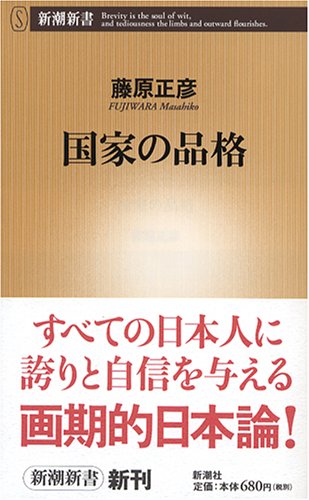
図書館で
先日『世にも美しい数学入門』を読みました。ちょっと残念な本でしたが、「『国家の品格』を書いた人か。読んでないな。そのうち読むかもなあ。」と思っていました。
なんか『美しい国』みたいで、読む気は殆どありませんでしたが、昨日、図書館で偶然見つけたので、手に取りました。
面白かったです。結論は私と違いますが、思っていることは同じだな、と思いました。
論理
彼は数学者なので、論理そのものを否定するのではありません。「AならばB」は論理的に正しいんだけども、「どうしてAをえらぶか」というのは論理外だ、ということです。
そして、Aを選ぶのは「総合判断力」であり、それには「情緒力」(と「かたち」の尊重)が必要だという話です。
「自由」「平等」「民主主義」はダメ。「家族愛」「郷土愛」「祖国愛」「人類愛」が必要、という論理の流れは、一部事実と違う記述があるものの、小さい頃から「あたりまえだ」と思っていたものを、改めて考えさせられました。
論理(理論、ロゴス)の世界、それは「主体性の論理」です。主体性があるかぎり、その結果として、「自由」「平等」「民主主義」が生まれます。あるいは「ファシズム」か。
強制ではなくて、それらを抑えるためには、その論理こそが問われなければならないと思います。
美しい国
こういう発想は、数学者だからできるのか、まだ、美しい日本が残っていた頃に幼青年期を過ごしてきたからなのかはわかりません。
私はいま、ちょうど彼がこの本を書いた歳になりました。やっぱり還暦をすぎるとこういう発想が出てくるのかもしれませんね。
私自身が食わず嫌いをしてきたのは、自分が論理で負けると思っていたせいかもしれません。
若ころは「食わず嫌い」も仕方がないと思います。いそがしいですしね。
でも、若い頃に読んだものは、明に暗に身についているものです。彼がいうように、若い頃に「名作」「名著」と言われるものは読んでおくべきだったなあ、と思う今日このごろです。
以下は、書抜です。
抜粋とメモ
「例えば十一世紀、十二世紀になっても、まだ√2が有理数かどうかすらわからない。・・・有理数でないことは、ピタゴラスが活躍していた古代ギリシャではもうわかっていた。・・・文明は着実に進歩しても、文化は退歩することがある、という典型的な例です。」(P.15)――進歩って何?
「論理的に正しいことと善悪は別次元のことです。」(P.29)――ごもっとも。
「デリバティブは、確率微分方程式というかなり高級な数学を用いた経済理論にのっとっています。」(P.33)――ふーん
「表現する手段よりも表現する内容を整える方がずっと重要なのです。」(P.40)――そのとおり。だから、私は外国語は諦めた。(笑)
(AならばBの)「このA は、論理的帰結ではなく常に仮説なのです。そして、この仮設を選ぶのは論理ではなく、主にそれを選ぶ人の情緒なのです。宗教的情緒をも含めた広い意(FF)味の情緒です。」(P.50-51)
(エリートを養成している欧米でも)「女性問題のスキャンダルは時々あります。こちらはどんな教育をしてもなくなりません。」(P.87)――はは。
「自然への繊細な感受性を厳選とする美的情緒が、日本人の核となって、世界に例を見ない芸術を形作っている。「悠久の自然と儚い人生」という対比の中に美を感じる、という類まれな能力も日本人にはあります。(LF)日本という土地には、台風や地震や洪水など、一年を通じて自然の脅威が絶えません。他国よりも余計に「悠久の自然と儚い人生」という対比を感じやすい。「無常観」というものを生み出しやすい風土なのでしょう。」(P.98)――日下部氏もギリシャの多神教とヘブライ(砂漠)の一神教を述べています。でも、ヨーロッパは自然が豊かなんじゃないかな(知らないけど)。そこで一神教と主体性の哲学が流行った理由がわからない。
「明治以降、この二つのもの、美と醜をないまぜにした「愛国心」が、国を混乱に導いてしまったような気がします。言語イコール思考なのです。」「戦後は祖国愛という言葉すらなかったようなものですから、そのような情緒が希薄になるのも当然です。言語イコール情緒でもあるのです。」(P.115)――微妙。
「情緒や形を育てる主力は読書なのです。」(P.147)――違う、反対です、と言い切れないのが残念。漫画でもいいわけ?
「ただ、人間が利害得失にこだわるということは、もう仕方がないことです。人間には生存本能というものがあって、利害得失で動くよう遺伝子レベルで組み込まれているのですから。しかし、残りの1%を何で埋めるか、これが非常に重要なのです。」(P.150)――数学者だから、生物学を知らない?生存本能、遺伝子という時点で、主体性論理から抜け出せないのがわかります。
「現代人の感じるそこはかとない閉塞感、社会に漂う虚脱感には、人間中心主義により人間が自然と対立関係に陥ったという事実が深く影響しているような気がします。」(P.153)――「ニヒリズム」、そうなんだけど、自然を(そして自分をも)客体化すること、そして魂(精神)の主体性を自覚すること、これがすべての原因です。
「どんな国でも経済的に発展する場合、常に工業の発展がベースとなります。金融やサービスによる繁栄は、偽の反映であり長続きしません。」(P.161)――生産中心主義
⟨impressions⟩
at the library
The other day, I read "Introduction to Beautiful Mathematics in the World ". It was a little disappointing book, but I thought, "Are you the one who wrote" National Dignity "? I haven't read it.
It looked like a "beautiful country" and I didn't really want to read it, but I happened to find it in the library yesterday, so I picked it up.
It was interesting. The conclusion is different from mine, but I thought it was the same.
Logic
Since he is a mathematician, he does not deny the logic itself. "If A, then B" is logically correct, but "why choose A" is out of the logic.
And it is said that choosing A is "comprehensive judgment", which requires "emotional power" (and respect for "shape").
"Freedom," "equality," and "democracy" are not good. The logical flow that "family love," "local love," "homeland love," and "humanity love" are necessary is different from the facts, but what I thought was "natural" from a young age is renewed. I was made to think.
The world of logic (theory, logos), it is the "logic of subjectivity". As long as there is independence, the result is "freedom," "equality," and "democracy." Or is it "fascism"?
I think that logic must be questioned in order to suppress them, not to force them.
Beautiful country
I don't know if this kind of idea can be made by a mathematician, or because I spent my childhood when beautiful Japan remained.
I'm just the age he wrote this book. After all, after the 60th birthday, such an idea may come out.
The reason I hate it without eating it may be because I thought I would lose in logic.
When I was young, I think it's unavoidable to "hate without eating". It's busy.
But what I read when I was young is something that I have learned implicitly. As he says, I think I should have read what is called a "masterpiece" or "masterpiece" when I was young, these days.
The following is an excerpt.
Excerpts and notes
"For example, even in the 11th and 12th centuries, I still don't know if √2 is a rational number .... I already knew that it wasn't a rational number in ancient Greece, where Pythagoras was active. Is a classic example of the fact that culture can retreat even if it progresses steadily. ”(P.15) ――What is progress?
"Logically correct and good and evil are different dimensions." (P.29) -Yes.
"Derivatives are based on an economic theory that uses a fairly high-level mathematics called stochastic differential equations." (P.33) ――Hmm
"It is much more important to arrange the content to be expressed than the means to express it." (P.40) -That's right. So I gave up on a foreign language. (Lol)
"This A is always a hypothesis, not a logical consequence (if A then B), and it is not the logic that chooses this hypothesis, but the emotion of the person who chooses it primarily. It is an emotion of broad meaning (FF) taste including. "(P.50-51)
(Even in Europe and the United States, which trains elites) "There are occasional scandals about women's problems. This does not go away with any education." (P.87)-Haha.
"The aesthetic sentiment, which carefully selects delicate sensitivity to nature, has become the core of the Japanese people and forms an art that is unprecedented in the world. Beauty is created in the contrast of" eternal nature and ephemeral life. " The Japanese also have the unique ability to feel. (LF) The land of Japan is constantly threatened by nature such as typhoons, earthquakes and floods throughout the year. It is easier to feel the contrast of "eternal nature and ephemeral life" than in other countries. Perhaps it is a climate that makes it easy to create something called "impermanence." (P.98) -Mr. Kusakabe also describes Greek polytheism and Hebrew (desert) monotheism. But I think Europe is rich in nature (I don't know). I don't understand why monotheism and the philosophy of subjectivity became popular there.
"Since the Meiji era, I feel that these two things," patriotism, "which mixes beauty and ugliness, have led to turmoil in the country. It is language equal thinking. "Since it seems that the word" love of the motherland "was not even used after the war, it is natural that such feelings are diluted. It is also a language equal feeling." (P.115) ――Subtle.
"Reading is the main force that nurtures emotions and shapes." (P.147) -It's a pity that I can't say that it's different or the opposite. Is it okay to use manga?
"However, it is unavoidable that human beings are particular about their interests and losses. Humans have a survival instinct, and they are integrated at the genetic level to move with their interests and disadvantages. But the rest What fills 1% with is very important. ”(P.150) ――Because you are a mathematician, do you know biology? At the point of survival instinct and genes, we can see that we cannot get out of the subjectivity logic.
"I feel that the fact that humans have fallen into a confrontational relationship with nature due to anthropocentrism has a profound effect on the feeling of obstruction and the feeling of collapse in society that modern people feel." (P.153) ) ―― "Anthropocentrism", yes, to objectify nature (and yourself), and to be aware of the independence of the soul (spirit), this is all the cause.
"Economic development in any country is always based on industrial development. Prosperity through finance and services is a false reflection and does not last long." (P.161) -Production-centricism
at the library
The other day, I read "Introduction to Beautiful Mathematics in the World ". It was a little disappointing book, but I thought, "Are you the one who wrote" National Dignity "? I haven't read it.
It looked like a "beautiful country" and I didn't really want to read it, but I happened to find it in the library yesterday, so I picked it up.
It was interesting. The conclusion is different from mine, but I thought it was the same.
Logic
Since he is a mathematician, he does not deny the logic itself. "If A, then B" is logically correct, but "why choose A" is out of the logic.
And it is said that choosing A is "comprehensive judgment", which requires "emotional power" (and respect for "shape").
"Freedom," "equality," and "democracy" are not good. The logical flow that "family love," "local love," "homeland love," and "humanity love" are necessary is different from the facts, but what I thought was "natural" from a young age is renewed. I was made to think.
The world of logic (theory, logos), it is the "logic of subjectivity". As long as there is independence, the result is "freedom," "equality," and "democracy." Or is it "fascism"?
I think that logic must be questioned in order to suppress them, not to force them.
Beautiful country
I don't know if this kind of idea can be made by a mathematician, or because I spent my childhood when beautiful Japan remained.
I'm just the age he wrote this book. After all, after the 60th birthday, such an idea may come out.
The reason I hate it without eating it may be because I thought I would lose in logic.
When I was young, I think it's unavoidable to "hate without eating". It's busy.
But what I read when I was young is something that I have learned implicitly. As he says, I think I should have read what is called a "masterpiece" or "masterpiece" when I was young, these days.
The following is an excerpt.
Excerpts and notes
"For example, even in the 11th and 12th centuries, I still don't know if √2 is a rational number .... I already knew that it wasn't a rational number in ancient Greece, where Pythagoras was active. Is a classic example of the fact that culture can retreat even if it progresses steadily. ”(P.15) ――What is progress?
"Logically correct and good and evil are different dimensions." (P.29) -Yes.
"Derivatives are based on an economic theory that uses a fairly high-level mathematics called stochastic differential equations." (P.33) ――Hmm
"It is much more important to arrange the content to be expressed than the means to express it." (P.40) -That's right. So I gave up on a foreign language. (Lol)
"This A is always a hypothesis, not a logical consequence (if A then B), and it is not the logic that chooses this hypothesis, but the emotion of the person who chooses it primarily. It is an emotion of broad meaning (FF) taste including. "(P.50-51)
(Even in Europe and the United States, which trains elites) "There are occasional scandals about women's problems. This does not go away with any education." (P.87)-Haha.
"The aesthetic sentiment, which carefully selects delicate sensitivity to nature, has become the core of the Japanese people and forms an art that is unprecedented in the world. Beauty is created in the contrast of" eternal nature and ephemeral life. " The Japanese also have the unique ability to feel. (LF) The land of Japan is constantly threatened by nature such as typhoons, earthquakes and floods throughout the year. It is easier to feel the contrast of "eternal nature and ephemeral life" than in other countries. Perhaps it is a climate that makes it easy to create something called "impermanence." (P.98) -Mr. Kusakabe also describes Greek polytheism and Hebrew (desert) monotheism. But I think Europe is rich in nature (I don't know). I don't understand why monotheism and the philosophy of subjectivity became popular there.
"Since the Meiji era, I feel that these two things," patriotism, "which mixes beauty and ugliness, have led to turmoil in the country. It is language equal thinking. "Since it seems that the word" love of the motherland "was not even used after the war, it is natural that such feelings are diluted. It is also a language equal feeling." (P.115) ――Subtle.
"Reading is the main force that nurtures emotions and shapes." (P.147) -It's a pity that I can't say that it's different or the opposite. Is it okay to use manga?
"However, it is unavoidable that human beings are particular about their interests and losses. Humans have a survival instinct, and they are integrated at the genetic level to move with their interests and disadvantages. But the rest What fills 1% with is very important. ”(P.150) ――Because you are a mathematician, do you know biology? At the point of survival instinct and genes, we can see that we cannot get out of the subjectivity logic.
"I feel that the fact that humans have fallen into a confrontational relationship with nature due to anthropocentrism has a profound effect on the feeling of obstruction and the feeling of collapse in society that modern people feel." (P.153) ) ―― "Anthropocentrism", yes, to objectify nature (and yourself), and to be aware of the independence of the soul (spirit), this is all the cause.
"Economic development in any country is always based on industrial development. Prosperity through finance and services is a false reflection and does not last long." (P.161) -Production-centricism
[出演者(プロフィール)等]
藤原/正彦
1943(昭和18)年旧満州生まれ。東京大学理学部数学科卒、同大学院修士課程修了。都立大学助手、コロラド大学助教授などを経て、現在お茶の水女子大学理学部教授。数学者。作家新田次郎、藤原ていの次男。著書に『若き数学者のアメリカ』「遙かなるケンブリッジ』『天才の栄光と挫折』など多数。共著に、小川洋子氏との対談『世にも美しい数学入門』がある。
日本は世界で唯一の「情緒と形の文明」である。国際化という名のアメリカ化に踊らされてきた日本人は、この誇るべき「国柄」を長らく忘れてきた。「論理」と「合理性」頼みの「改革」では、社会の荒廃を食い止めることはできない。いま日本に必要なのは、論理よりも情緒、英語よりも国語、民主主義よりも武士道精神であり、「国家の品格」を取り戻すことである。すべての日本人に誇りと自信を与える画期的日本論。


